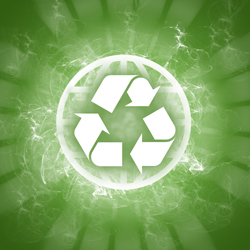 In our last post, we looked at some ways to green your computer, particularly on the software and server sides. But there are other ways to make your electronic and computing life a little greener.
In our last post, we looked at some ways to green your computer, particularly on the software and server sides. But there are other ways to make your electronic and computing life a little greener. First and foremost is proper recycling of your computer and other electronic devices. Computers, batteries, cell phones, televisions and other electronics can – and certainly should – be recycled. As more companies and communities work to eliminate e-waste, it’s becoming increasingly easier to recycle electronics. That means you have no excuse.
The Environmental Protection Agency has a partnership with leading electronics manufacturers – called Plug-In To eCycling – that fosters opportunities for consumers to donate or recycle their electronics. In 2008, this program recycled more than 66.5 million pounds of used electronics – a 30 percent jump from the previous year. According to the EPA, those recycled items prevented the release of greenhouse gases equal to the annual emissions from about 15,500 cars.
Information from the EPA indicates consumer electronics – including televisions and video equipment, computers and phones – make up about 2 percent of the municipal solid waste stream. Now, that might not sounds like much in the grand scheme of things, but that number increases with our dependency on electronics and our need for the latest iPhone, laptop and gaming machine.
This eCycling Resources page from the EPA Web site has plenty of information on how and where to recycle your items. Businesses, especially those that upgrade computers every year or two, may be able to donate their items to a local nonprofit or school. They may also be able to receive a tax deduction for a contribution.
Another way take your computing green, as it relates to energy use, is through energy monitoring. Just this week, President Obama announced that projects in most U.S. states, D.C. and Guam would receive federal money for smart-grid projects. According to the New York Times, “The money will go toward deploying more smart meters, which use digital technology to deliver detailed usage data to the customer and the utility, as well as adding displays in homes that tell customers about their electricity use and improving technology in substations, transformers and other parts of the grid.”
If you want to get a taste of the concept of monitoring, check out Google’s PowerMeter in your small business or home office. It’s a free electricity usage monitoring tool so you can see just how much energy you’re consuming. You’ll be able to see whether turning off and unplugging your computer at night is really making a difference (I bet you’ll be pleasantly surprised.)
Finally, if you need more convincing on the importance of green computing, take a look at these 48 clean-tech facts compiled by PC Magazine. (Wow! The energy saved by recycling one plastic bottle can power a computer for 25 minutes!)
[ 3 comments ] ( 321 views ) | [ 0 trackbacks ] | permalink |




 ( 3 / 2599 )
( 3 / 2599 ) 


 Looking for a Green Office Solution?
Looking for a Green Office Solution?